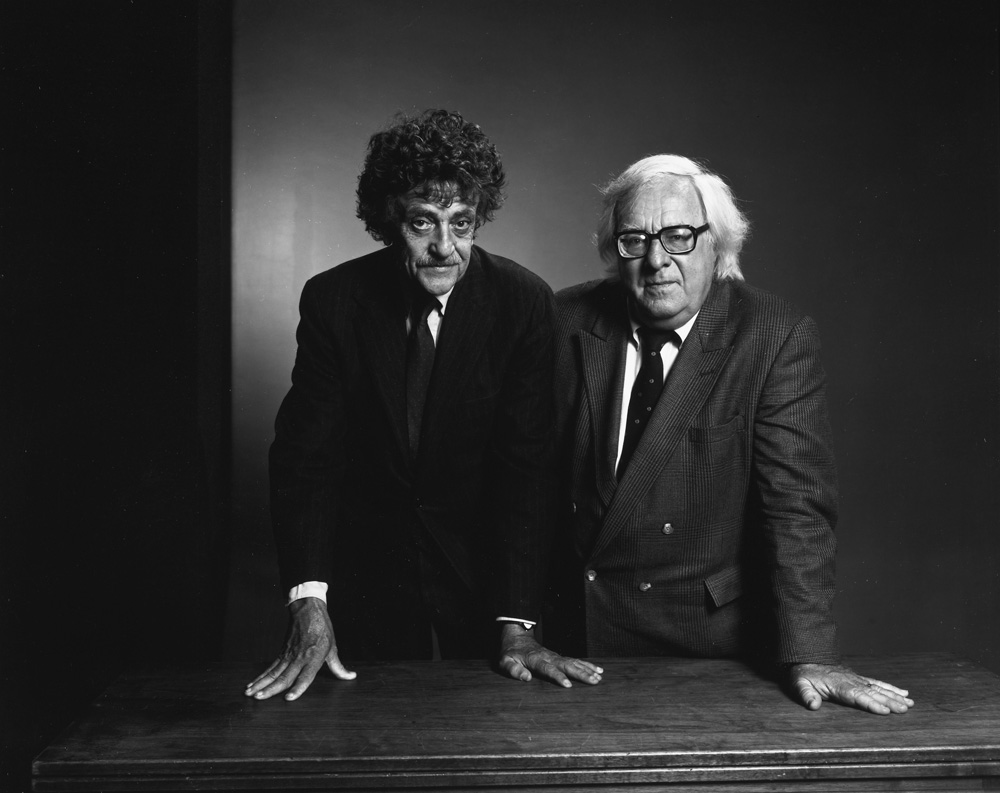"What is the name of the Bradbury story where..." is the frequent start to questions on the Bradbury message boards. Some of the time, the description which follows is indeed a summary of a Bradbury story. Surprisingly often, though, there will follow an outline of a story by someone else. Most frequently it will be Kurt Vonnegut's "Harrison Bergeron", but other writers frequently mistaken for Bradbury include Arthur C. Clarke, John Wyndham and Isaac Asimov.
Bradbury and Asimov were completely different in terms of writing style, imagery and themes. And yet they were remarkably similar in a number of ways:
- They were born in the same year, 1920.
- They both attended the first ever World Science Fiction Convention, in New York, 1939.
- They both started their prolific writing careers with short stories in the 1940s pulp magazines before moving into mainstream publications and 1950s hardcovers.
- From the 1960s onwards, they both became somewhat distanced from the SF genre which had given them their early successes, Bradbury by working in film, theatre and poetry, and Asimov by working on non-fiction works.
- They both had something of a creative resurgence in the 1980s, with a return to major novel writing.
Oh, and neither of them cared much for flying.
So you'd think they might know each other, or even be the best of friends. And yet I can find very few references to them meeting.
Asimov wrote magnificently detailed autobiographies, based in part on the careful diaries he kept for most of his adult life. In these he makes just a couple of references to Bradbury. The first appears in
In Memory Yet Green (pages 320-321), where he mentions Bradbury's first appearance in the leading science fiction pulp magazine
Astounding Stories:
 On November 17 [1942], the day Campbell took “Bridle and
Saddle,” he told me of a plan of his for starting a new department in Astounding, one to be called
“Probability Zero”.
On November 17 [1942], the day Campbell took “Bridle and
Saddle,” he told me of a plan of his for starting a new department in Astounding, one to be called
“Probability Zero”.
This was to be a department of short-shorts, five hundred to
one thousand words each, which were to be in the nature of plausible and
entertaining Munchausen-like lies. Campbell’s notion was that, aside from the
entertainment value of these things, they would offer a place where beginners
could penetrate the market without having to compete quite so hard with
established writers. They would form a stairway to professional status.
This was a good idea in theory and even worked a little in
practice. Ray Bradbury, who was to become one of the best-known and most
successful of all science-fiction writers, broke into the field with a
“probability Zero” item half a year later. Hal Clement and George O. Smith also
published “Probability Zero” items near the very start of their careers.
Unfortunately, it didn’t work enough. Campbell had to start the
department going with professionals, hoping to let the amateurs carry on once
they saw what it was Campbell wanted. There were, however, never enough
amateurs who could meet Campbell’s standards even for short-shorts of an
undemanding nature, and after twelve appearances of “Probability Zero” over a
space of 2.5 years, Campbell gave up.
In the sequel volume
In Joy Still Felt, Asimov mentions his first ever meeting with Bradbury, which occurred in 1965 (although they could conceivably have met at the 1939 Worldcon without realising it - there were around 185 attendees at the convention). It is the
only meeting between the two that he mentions, although I find it hard to believe that their paths crossed only once. Here is how Asimov describes (on page 381) the meeting, which took place on a TV show:
The next day [Oct 8 1965] I went to Newark to tape a talk
show with David Susskind. It was my first nationally televised talk show since
“The Last Word” with Bergen Evans six years before.
This one was devoted to science fiction, and along with me
were Lester del Rey and Ray Bradbury. It was the first time I had ever met Ray
Bradbury, though of course we knew each other well enough from our writings to
be on a first-name basis at once. Neither he nor I would fly in airplanes, so
since I lived in Newton and he in Los Angeles it was clear we couldn’t meet
often.
The session was not successful. Lester was in one of his
talkative moods and gave neither Ray nor myself much chance to do anything but
stare at the ceiling, and Susskind had a list of questions, silly in
themselves, from which he lacked the wit to depart. It meant that all the
interesting starts that any of us made were muffled and killed when he asked
the next silly question.
Bradbury was a Californian for the whole of his adult life. Asimov was a New Yorker. Perhaps this is what prevented them meeting more often. I think today we have this idea that science fiction and fantasy writers all know each other, largely because of the historical importance to the genre of conventions and other social gatherings. It therefore seems odd that these two similar men, whose works were often mistaken for each other's, met so rarely.

